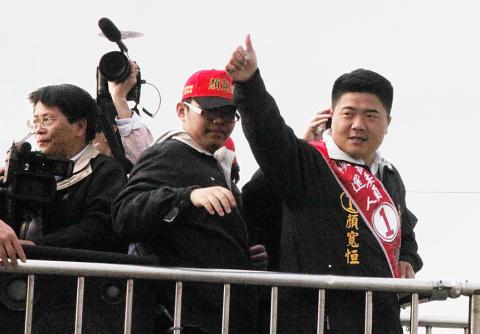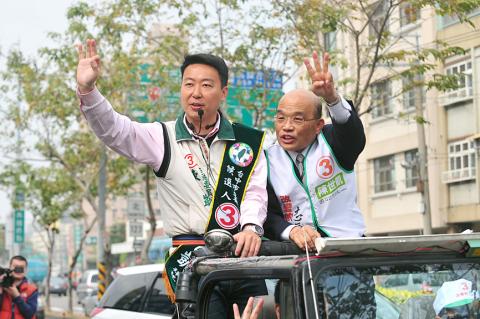Yen Kuan-hen (顏寬恆), the Chinese Nationalist Party’s (KMT) candidate in today’s legislative by-election in Greater Taichung’s second district, yesterday made a last-minute plea for voter support, while the pan-blue camp expressed confidence in his victory.
Yen’s father, former Non-Partisan Solidarity Union legislator Yen Ching-piao (顏清標), accompanied his son on a campaign motorcade to solicit support around the city.
Yen Ching-piao said that while the by-election is a tough battle, his son should benefit from a higher voter turnout as more people are expected to cast their votes in the neck-and-neck race.

Photo: CNA
He dismissed the Democratic Progressive Party’s (DPP) attempt to promote the by-election as a vote of no-confidence in President Ma Ying-jeou’s (馬英九) governance, and said that he was confident about local support for his family because he has earned support across party lines in the past with his dedicated service in Taichung.
Yen Ching-piao, whose elected status was revoked after he was found guilty of corruption, has enjoyed long-term support in the electoral district, and the KMT nominated his son for the by-election with the aim of continuing the pan-blue camp’s influence in the area.
Meanwhile, the DPP, which is seeking victory in the traditional pan-blue stronghold, has garnered party heavyweights, including DPP Chairman Su Tseng-chang (蘇貞昌) and former DPP chairperson Tsai Ing-wen (蔡英文), to campaign for its candidate, Chen Shih-kai (陳世凱).

Photo: Liao Yau-tung, Taipei Times
While the by-election is seen as a crucial battle ahead of the local government elections next year, President Ma Ying-jeou (馬英九), who doubles as KMT chairman, has been absent from Yen Kuan-hen’s campaign.
Ma, who has seen his approval rating fall to record lows, is also facing challenges to his re-election bid as party chairman. The latest survey released by the Chinese-language newspaper China Times showed that 49 percent of the 823 respondents said they do not support Ma’s re-election bid, and 58 percent said they were not satisfied with his performance as KMT chairman.
The poll, conducted on Wednesday, also found that 48 percent of respondents thought that Ma doubling as the KMT chairman in the future would help neither the party nor his government’s performance.
Chiang Shih-liang (江士良), director of the KMT’s Greater Taichung branch, dismissed concerns about Ma’s absence from the by-election campaign, and said that the DPP’s attempts to emphasize political confrontation in the by-election was not a smart strategy, as local voters cared more about the candidates’ dedication to local development.
Yen Kuan-hen also expressed confidence in his election bid and promised to continue his father’s service in the district if elected.

CHANGING LANDSCAPE: Many of the part-time programs for educators were no longer needed, as many teachers obtain a graduate degree before joining the workforce, experts said Taiwanese universities this year canceled 86 programs, Ministry of Education data showed, with educators attributing the closures to the nation’s low birthrate as well as shifting trends. Fifty-three of the shuttered programs were part-time postgraduate degree programs, about 62 percent of the total, the most in the past five years, the data showed. National Taiwan Normal University (NTNU) discontinued the most part-time master’s programs, at 16: chemistry, life science, earth science, physics, fine arts, music, special education, health promotion and health education, educational psychology and counseling, education, design, Chinese as a second language, library and information sciences, mechatronics engineering, history, physical education

The Chinese military has boosted its capability to fight at a high tempo using the element of surprise and new technology, the Ministry of National Defense said in the Quadrennial Defense Review (QDR) published on Monday last week. The ministry highlighted Chinese People’s Liberation Army (PLA) developments showing significant changes in Beijing’s strategy for war on Taiwan. The PLA has made significant headway in building capabilities for all-weather, multi-domain intelligence, surveillance, operational control and a joint air-sea blockade against Taiwan’s lines of communication, it said. The PLA has also improved its capabilities in direct amphibious assault operations aimed at seizing strategically important beaches,

‘MALIGN PURPOSE’: Governments around the world conduct espionage operations, but China’s is different, as its ultimate goal is annexation, a think tank head said Taiwan is facing a growing existential threat from its own people spying for China, experts said, as the government seeks to toughen measures to stop Beijing’s infiltration efforts and deter Taiwanese turncoats. While Beijing and Taipei have been spying on each other for years, experts said that espionage posed a bigger threat to Taiwan due to the risk of a Chinese attack. Taiwan’s intelligence agency said China used “diverse channels and tactics” to infiltrate the nation’s military, government agencies and pro-China organizations. The main targets were retired and active members of the military, persuaded by money, blackmail or pro-China ideology to steal

DEADLOCK: As the commission is unable to forum a quorum to review license renewal applications, the channel operators are not at fault and can air past their license date The National Communications Commission (NCC) yesterday said that the Public Television Service (PTS) and 36 other television and radio broadcasters could continue airing, despite the commission’s inability to meet a quorum to review their license renewal applications. The licenses of PTS and the other channels are set to expire between this month and June. The National Communications Commission Organization Act (國家通訊傳播委員會組織法) stipulates that the commission must meet the mandated quorum of four to hold a valid meeting. The seven-member commission currently has only three commissioners. “We have informed the channel operators of the progress we have made in reviewing their license renewal applications, and